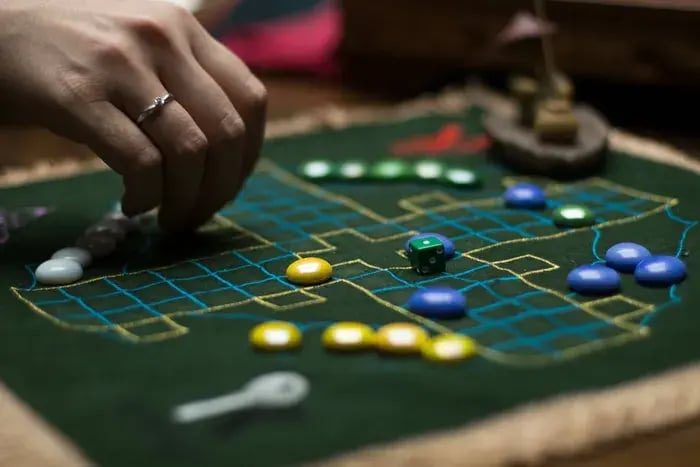- Choose a Theme and Plot
- Objective Determination
- Game Board Designing
- Rules and Instructions
- Create Game Pieces and Cards
- Playtest and Revise
- Unique Name and Packaging
- Develops Problem Solving and Critical Thinking
- Encourage Creativity and Innovation
- Develops Communication and Social Skills
- Improves Concentration and Patience
- Fosters Family Bonding and Shared Learning
Introduction
Games are something that's integral to childhood as they provide hours and hours of fun and enjoyment. But ever imagined if children were given opportunities to develop their own games? Designing a board game encourages creative problem-solving and teamwork. It allows kids to channel their imagination while learning great skills. Playing games for kids isn't just about competition; there is learning from hands-on experiences. Creating a board game enhances a child's cognitive abilities, builds patience, and nurtures communication skills. It also offers a unique way to bond with family and friends while nurturing a sense of achievement. When children invent their own games, they practice logic, planning, and strategy—all while having fun. Here are some engaging ways to guide children in making their own board games.
7 Tips to Design Your Board Game
Choose a Theme and Plot
Any board game needs to have a theme. It might be a journey into outer space, a magic kingdom, or a safari jungle. Get kids thinking about what excites them the most. A great storyline keeps people engaged and wanting more from a board game. A children's game should include action and excitement for the children who will want to come back to play more often.
Objective Determination
What is the purpose of the game? It can be a treasure hunt, rescue of a character, or gaining points. Children should clearly define the rules of how players advance and win. A well-defined objective will make the game structured and enjoyable. This is a step where children learn to set goals and build strategies in a fun way.
Game Board Designing

A game board is what makes the idea a reality. The kids can draw paths, obstacles, and checkpoints on paper, cardboard, or any material that is available. Let them color and illustrate to make it visually appealing. Designs of boards are what make up the mechanics of the game. Allowing the kids to customize them is bound to bring out their creativity and artistic ability.
Rules and Instructions
A game, for it to be reasonably played, needs to have rules that are involved. Children should be writing down in which the gameplay is known, like movement mechanics, special actions, and penalties. Throwing the game around with other rules lets improve the playing experience. Writing down instructions gives an incentive to literal fluency skills and logical thinking.
Create Game Pieces and Cards
Game tokens, dice, spinners, or cards bring in fun. Kids can make these items by using clay, cardboard, or even elements from old toys. Game pieces make playing more interactive and stir thinking because the kids decide how each piece can contribute to the gameplay.
Playtest and Revise
Before the game is finalized, children should playtest it with friends or family. Observing how others interact with the game helps identify what works and what needs adjustment. This step promotes adaptability and resilience as kids learn to refine their ideas based on feedback.
Unique Name and Packaging
A fantastic board game should have an interesting name and eye-catching packaging. Inspire the kids to give their game a name related to its theme and adventure. They can design a box or pouch to keep their board, pieces, and cards. This step shows them the concept of branding, presentation, hard work and creativity.
5 Advantages of Board Game Designing
Develops Problem Solving and Critical Thinking
Creating a game requires the development of thoughts concerning problems, player behavior prediction, and solutions for potential issues. Children evaluate several situations and provide innovative solutions that enhance logical reasoning. Decision-making games for kids to play equip them for problem-solving in reality.
Encourage Creativity and Innovation

Designing the board, the characters, and rules all require a good amount of imagination. One develops originality and innovation due to that; creativity in game-making helps children feel proud of themselves for thinking of new ideas.
Develops Communication and Social Skills
While the kids design and test out their games, they learn how to clarify rules, negotiate rules for change, and work together with others. Communication is a major skill used in school and later on. Board games encourage social interaction, teaching children patience, acceptance, and teamwork.
Improves Concentration and Patience
Building a game from the ground up entails planning, designing, and testing, thus encouraging patience and concentration. Kids understand that making something better is a time-consuming and laborious process. Resilience also learns as they continue to go through trial and error to create a perfect game.
Fosters Family Bonding and Shared Learning

Homemade board games are something that can unite the family as they play along. It builds quality bonding time and allows parents to join their child's creative learning process. Games that are self-made for kids to play add pride and accomplishment to the learning process.
Deepali Verma is a senior food and wellness writer with over a decade of experience in top media houses, crafting engaging narratives. She is a professional home baker and loves exploring food from every corner of the world to reading cookbooks. She believes a healthy lifestyle is a combination of mental, spiritual and physical fitness. Her goal always remains to keep moving, eating seasonal and practicing gratitude.
The views expressed are that of the expert alone.
The information provided in this content is for informational purposes only and should not be considered a substitute for professional medical advice, diagnosis, or treatment. Always seek the advice of your physician or another qualified healthcare provider before making any significant changes to your diet, exercise, or medication routines.
References
https://www.onehundredtoys.com/make-your-own-board-game/
https://acroll.medium.com/why-i-make-boardgames-with-my-daughter-3c2fdb73b33










